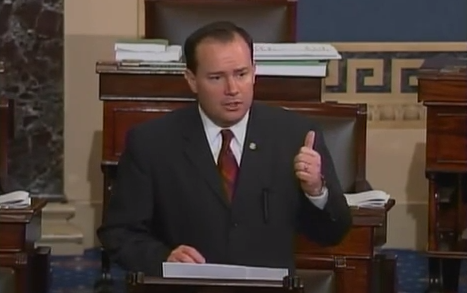December 2013 Tele-townhall: A Year in Review
Dec 17, 2013

Lee: Utah to Lose $32 Million in Budget Deal
Dec 16, 2013
Lee Names Derek Brown as Deputy Chief of Staff/State Director
Dec 12, 2013
Lee Introduces Act to Protect Religious Liberty
Dec 12, 2013
Shutting the American People Out of the Political Process
Dec 12, 2013

Lee Opposes House-Senate Budget Deal
Dec 11, 2013
Sen. Lee Hosts Poverty Roundtable
Dec 4, 2013

Hatch, Bishop, Lee Applaud Air Force Announcement on F-35
Dec 3, 2013
December 2013 - Mobile Office Schedule
Nov 26, 2013
Tuesday 3 December 2013 – Davis County
Mobile Office Visit to West Bountiful
When: Tuesday 3 December 2013 @ 10:00 AM – Noon
Where: West Bountiful @ West Bountiful City Hall, 550 North 800 West, West Bountiful, UT 84087 (Small Conference Room)
Mobile Office Visit to Syracuse
When: Tuesday 3 December 2013 @ 1:00 PM – 3:00 PM
Where: Syracuse, Utah @ Syracuse City Hall, 1979 West 1900 South, Syracuse, UT 84075 (TBD Room in City Hall)
Wednesday 4 December 2013 – Davis County
Mobile Office Visit to Woods Cross
When: Wednesday 4 December 2013 @ 10:00 AM – Noon
Where: Woods Cross, Utah @ Woods Cross City Hall, 1555 South 800 West, Woods Cross, UT 84087 (Multi-Purpose Room – enter through East glass doors)
Mobile Office Visit to Clearfield
When: Wednesday 4 December 2013 @ 2:00 PM – 4:00 PM
Where: Clearfield, Utah @ Clearfield Municipal Building, 55 South State Street, Clearfield, UT 84015 (Multi-Purpose Room – 2nd Floor)
Friday 6 December 2013 – Salt Lake County
Mobile Office Visit to Cottonwood Heights
When: Friday 6 December 2013 @ 10:30 AM – Noon
Where: Cottonwood Heights, Utah @ Whitmore Library, 2197 E. Ft Union Blvd, Cottonwood Heights, UT 84121 (Meeting Room)
Mobile Office Visit to MIllcreek
When: Friday 6 December 2013 @ 1:00 PM – 3:00 PM
Where: Millcreek, Utah @ Millcreek Community Library, 2250 E. Evergreen Ave, Salt Lake City, UT 84109 (Room C)
Monday 9 December 2013 – Wasatch County
What: Mobile Office Visit to Heber City
When: Monday 9 December 2013 @ 1:00 PM – 3:00 PM
Where: Heber City, Utah @ Heber City Office, 75 N Main, Heber City, UT 84032 (Council Chamber)
Who: Robert Axson, Larry Shepherd
How: POC: Michelle Kellogg, 435-654-0757 (Confirmed)
Tuesday 10 December 2013 – Morgan County
What: Mobile Office Visit to Morgan City
When: Tuesday 10 December 2013 @ 11:00 AM – 1:00 PM
Where: Morgan, Utah @ Morgan City Building, 90 West Young Street, Morgan, UT 84050 (Special Collections Room)
Who: Robert Axson
How: POC: Julie Bloxham, 801-829-3461 ext.1 (Confirmed)
Tuesday 10 December 2013 – Tooele County
What: Mobile Office Visit to Grantsville
When: Tuesday 10 December 2013 @ 2:00 PM – 4:00 PM
Where: Grantsville, Utah @ Grantsville Public Library, 42 N Bowery Street, Grantsville, UT 84029 (Special Collections Room)
Who: Larry Shepherd
How: POC: Linamarie Johnson, 435-884-1670 (Confirmed)
Wednesday 11 December 2013 – Salt Lake County
What: Mobile Office Visit to Murray City
When: Wednesday 11 December 2013 @ 9:30 AM – 11:30 AM
Where: Murray, Utah @ Murray City Heritage Center, 10 East 6150 South, Murray, UT 84107
Who: Robert Axson, Larry Shepherd
How: POC: Suzzane Gregory, 801-264-2635; Rondi Knowlton, 801-264-2602 (Confirmed)
What: Mobile Office Visit to Sandy City
When: Wednesday 11 December 2013 @ 1:00 PM – 3:00 PM
Where: Sandy, Utah @ Sandy City Hall, 1000 Centennial Parkway, Sandy, UT 84070 (East Conference Room, 3rd Floor)
Who: Robert Axson, Larry Shepherd
How: POC: Dave Goldhart, 801-568-7249; Sherry McConkey, 801-568-7109 (Confirmed)
Thursday 12 December 2013 – Box Elder County
What: Mobile Office Visit to Willard
When: Friday 12 December 2013 @ 10:00 AM – Noon
Where: Willard, Utah @ City Hall, 80 W 50 S, Willard, UT 84340
Who: Robert Axson
How: POC:Debbie Barker 435-734-9881 (Confirmed)
